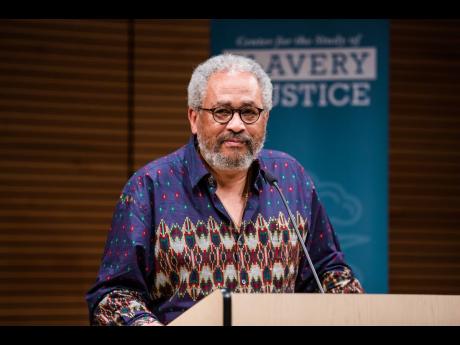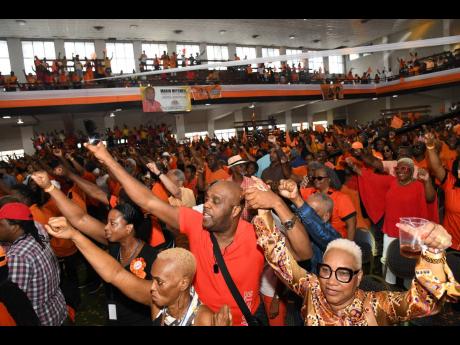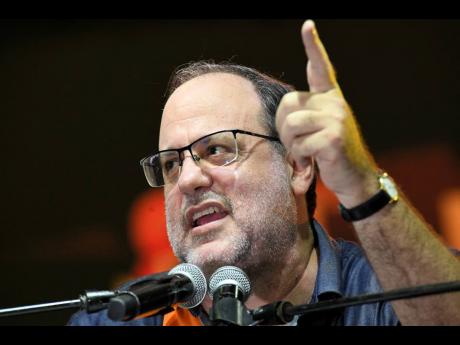Bogues Report excites PNP, recasting vision in modern light
The National Executive Council (NEC) of the People’s National Party (PNP) is to decide whether the party will substitute the term ‘democratic socialism’ for ‘democratic left’, an apparent cosmetic change to the political party’s ideology that it...
The National Executive Council (NEC) of the People’s National Party (PNP) is to decide whether the party will substitute the term ‘democratic socialism’ for ‘democratic left’, an apparent cosmetic change to the political party’s ideology that it adopted in 1974.
It was a proposal of the Professor Anthony Bogues-led commission, which the party appointed last year to craft a transformational 21st century policy and vision document, guided by equitable, economic, social and political development.
The report was presented and discussed at last week’s private session of the PNP’s 84th annual conference, with recommendations in keeping with the left of centre posture adopted by Michael Manley in the quest to define the contemporary and political philosophy of the party.
General Secretary Dr Dayton Campbell said the reception to the report was like “the return of the prodigal son”. He said there was no fear of the PNP moving from left of centre, only about how it would be defined.
The Bogues report, titled Transforming Jamaica: The Politics of Equity, Transformation and Participatory Democracy, made 10 major recommendations, nine of which have so far been accepted.
Breathing new life
Speaking with The Sunday Gleaner last week, Bogues, a Brown University professor, said the document, its findings, as well as the discourse since it was presented are breathing new life into the political party that has seen its visibility and viability floundering in recent years.
“The charge was not to investigate the ideological identity of the PNP, as much as it was to suggest a new vision for the 21st century. We have highlighted a new set of things that we think the party must be concerned with. What we have attempted to do is to suggest that the party return to its tradition of being a left party,” Bogues said.
He added that it was important for the distinction to be made as many Comrades interviewed in the year of consultation said they disengaged from the party because it had lost its identity and has became a follower rather than a leader in the local political landscape.
“A lot of persons believe that the party had lost its soul and was no longer the party of ideas. Lots of Comrades felt that the PNP lost the capacity to lead the country with ideas and be able to be a visionary political party and to take Jamaica to the next level. So many felt glad that the investigation was visionary before policy, as the vision would determine policy,” Bogues said.
Bogues’ recommendations came from investigations conducted with groups and individuals in 23 of the 63 constituencies.
He said he saw “the spirit of political activism and discourse rise to levels which many believed had died”.
“The way some people put it was that the PNP fall asleep at the wheel. People apportioned blame, but were extremely glad and say, ‘Thank God you [are] here’. Not me, per se, but someone like me to listen to them and have this discussion,” said the professor.
Bogues said he was absolutely “clear that they wanted a political reawakening”.
He believes that the PNP and all well-thinking Jamaicans should be concerned about the bloc of Jamaicans who are not voting as well as those not sure who they should cast ballots for.
“It was a question of recharging the political soul of the PNP in the 21st century way so that it can be attractive to the Jamaican people. What we want to do is to give the PNP hope again, and not so much into winning an election, but a vision of what is, and what they can become. We had that vision before, now it’s to advance that vision and make them into a reality,” said Bogues.
“But very importantly, it is about us giving hope to the country of a different society, one that is based on equality, social justice and one that opens up the economy for new players and gives the ordinary person a chance to make Jamaica his or her place of choice to live.”
PNP President Mark Golding said the Brian Meeks Report of 2007, which analysed that year’s election loss, had a different remit from what Bogues and his team were commissioned to do.
“This report is about the philosophy of the party and the ideological framework that ought to guide us in designing policies and programmes to bring to the people,” Golding said, referencing the Principles and Objectives of the PNP - the document that has guided its philosophy for decades.
“This is really a review, and updating of some of those documents some 30, 40 years [later]. The world has changed substantially in that period, so those were Cold War documents. The polarisation around ideology ended, we have the rise of China, Internet, globalisation and climate change, to mention a few,” Golding said.
“So this is going to be our second decade of this millennium restatement of what we are about.”
MOVED TO TEARS
PNP Vice-President Donna Scott-Mottley said she was moved to tears when the report was discussed as she was reminded of all the reasons she joined the party.
“I was very emotional because it was very refreshing to see that all the things that motivated me going into politics were documented; all the things that inspired me through a very, very challenging campaign. And I think my campaign was one of the worst, but I was motivated in spite of what I endured. And when I saw this document, and heard the contents, it was very inspirational and very moving to me,” she said.
Meanwhile, Bogues said the absence of political education also came up for discussion among Comrades, many believing that the younger generation was not sufficiently knowledgeable, and hence the eagerness to pull away from the political process.
The report provided a foundation of engagement on issues such as human rights and gender, disabilities, sovereignty and regionalism, the role of the State, market, capitalism, climate change, empowerment, democratic national progressive alliance, imperialism and imperial power, participatory democracy, culture, reparative justice, labour rights, quality of life, entrepreneurship and the democratic left.
Bogues had worked closely with former Prime Minister Michael Manley, and in the 1980s, he was the secretary of the PNP’s Political Education Commission.
The PNP says Bogues holds a deep understanding of the party’s earlier philosophies, as well as the necessary steps it must take in modernising those philosophies to meet the needs of today’s more interconnected world while serving the purpose of justice.



